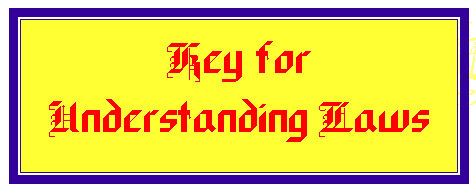
Edward D. Winstead, J.D.

Edward D. Winstead, J.D.
|
All Laws exist to control behavior. Laws fall into categories according to the method used to control specific behaviors. Understanding a law's category enables one to use that law to accomplish an objective or to lessen its interference with the accomplishment of an objective. Laws may include custom, regulations, contracts, rules, standards, procedures, or guidelines, etc. They may be written or unwritten, moral, ethical, or legal. A Law is defined as a rule of conduct or action prescribed by the authority of a rulemaker. The authority is recognized (or submitted to) by a person subordinate to the rulemaker. *** Assumptions ***People are responsible for their own actions. Laws are created to protect and control. A law's stated purpose may or may not be its real purpose. Examples: Laws controlling radio antennas in a sub-division may have the purpose of protecting appearance rather than preventing use of radios. The behavior is erecting antennas. Some highway speed laws were intended to reduce fuel consumption. All effective laws have sanctions (coercion). All actions result in Consequences . . . Unintended Consequences (Unknown, unforeseen, overlooked, may be desirable or undesirable). Unintended consequences (sanctions) often have the greatest impact on individuals or plans. The ability to act contrasted with the authority to act. Power is legitimate when combined with Authority. Power used without Authority is lawlessness. Power misused under guise of Authority is Tyranny. The Power abuser expects no one will dare interfere or take action to challenge the misuse of Power. The person challenging a Law by using Power may be: in an authority position, morally right, old enough, strong enough (physically or personality), intimidating enough, rude enough, polite enough, smart enough, ignorant enough, crazy enough, or wealthy enough to do what he wants regardless of Prescription, Prohibition, Permission, Sanction, or Consequences. Power is often tolerated by those who are excessively polite or civil; too scared, weak, or poor to protest or complain; believe they are unaffected by the action being taken; or simply do not understand the intended or unintended consequences. "Things" are what a particular law says they are. Example: A sailboat is a boat, it also may or may not be a powerboat. *** Categories of Laws *** |